

|
|
|
OCTOBER, 1907 |
THE CHINESE JEWS
By, Oliver Bainbridge
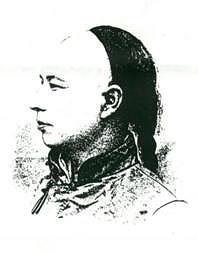
THE Chinese history affirms the city of Kaifengfu to have been the metropolis of the province and the seat of the empire during a long succession of monarchs, till it was at length overflowed and covered with sand by a great inundation. It is situated in a large fertile plain, about 5 or 6 miles from the Yellow River, and its low situation occasioned its ruin in 1642, when it was closely besieged by the rebel Li Chung, at the head of 100,000 men. The general who was sent to relieve it conceived the fatal design of drowning the besieging army by breaking the great bank which had been reared at a vast cost to preserve the country from being overflowed by the Great Yellow River. His project succeeded, indeed, but proved the ruin and destruction, not only of the noble capital but of three hundred thousand inhabitants, by the violence and rapidity of the inundation.
Some fifty years after this dreadful catastrophe a Jesuit missionary, going upon some occasion into the province of Honan, found a considerable Synagogue in the city of Kaifengfu. He soon became acquainted with some of its learned chiefs, who introduced him into their Synagogue and showed him one of the Parchments or rolls of the Pentateuch written in Hebrew, together with the books of Joshua, Judges, Samuel, Kings, some of the prophets, and others containing their liturgy and commentaries they owned. They had lost some of the sacred books and some of their targums or paraphrases. This loss was caused by a violent overflowing of the great river, which had laid the capital wholly under the water and had damaged their Torah, or roll of the Pentateuch, and upon which they ordered twelve new copies to be taken from it. Today I find no synagogue, owing to another overflowing of the Yellow River -- "China's Sorrow" -- but in its place a dirty pond and a stone erected on the site bearing the following strange inscription: "A monument in memory of the Great Ching Ching Cenoby. Oh Wu Lo Hau, the creator of this religion and grandson of the nineteenth generation of Punku, the principal ruler of the Mythical Era, was born in 146th year of the Chow dynasty (976 B.C.). He proved himself to be very wise, prudent, and merciful. He understood the mysteries of creation and the ideas of creation and could trace the troubled source of religion. The religious elements were not to believe in any idolatrous representation and not to flatter the ghost and fairy, and so many people were at liberty to serve his religion as Cenobites in a manner that was as free as running water. The successor of Oh Wu Lo Hau was called La, and was born in the 613th year of the Chow dynasty. His conscience and benevolence were noted by ever one as he traveled to the La-na Mountains for the purpose of informing them regarding the Scripture. He restricted himself to fruits and vegetables instead of meat and bathed and fasted for forty days and nights. He attended to his duty with the utmost simplicity and sometimes even forgot to eat or sleep, but never ceased to pray with a sincere heart to his God, for he had obtained a book containing many sections. In this book there were strange things that could not be easily explained -- in short, it indicate that the good was affected by those who became good, and the evil by those who did not bear in mind the warning. The successor of La was called Lo Tze Loh, and received from his predecessor the proper doctrine and explained the four words -- "ching" (clear), "chew" (pure), "li" (ceremonial), and "pai" to worship with a bow). The word "ching" means to "direct your heart singly to one religion". The word "chew" means "not to be confused by any other secular ideas." The word "Ii" means "to stand on ceremony." and the word "pai" "to worship with a bow." With these instructions, the Cenobites were to teach one another in the future.
During the beginning of the Sung Dynasty (96 A. D.) there was a missionary surnamed "Li," who was accompanied by a crowd of Cenobites, and arrived in China with a lot of western cloth, which they presented to the Emperor of the Sung Dynasty and became citizen of the country. Subsequently one of the grandsons of these people, called "Mu Sy Ta Pan," was appointed to do the preaching, and another, called "Jen Tu La," began to build a cenoby. It was destroyed after that and had to be rebuilt southeast of Tu Chai, in the 16th year of the Yuen dynasty (1280 A. D.)
The Emperor Tai-Tsu, of the Ming dynasty (1368 A. D.), gave the Cenobites descended from Li a piece of land for their building, because he could well understand their Scriptures, which persuaded the people to good instead of evil.
In the year of "Wung Lo" (1403 A.D.) the Cenoby was rebuilt, and was long afterwards destroyed by, water, and the ruined scene that exists now proves this little bit of narrative. .
The vast community referred to in the inscription has dwindled down to 8 families, numbering in all about fifty persons, who have in a great measure forgotten their characteristic observances through frequent vicissitudes and varied conditions of life.
I reached the main gate of the city of Kaifengfu (the ancient capital of the Middle Kingdom) one night about ten thirty, with not too favorable an impression of Chinese carts or the shaggy little Chinese pony, which had a great habit of tearing off at every opportunity. The soldiers belabored the massive gate most industriously for about twenty minutes, when a small trap-door opened and the gate-keeper hurled epithets at us that volcanic and picturesque. But his sattron-colored palm had been covered with a few coins, his ruffled nature became as smooth as a sheet of polished silver, and we entered the ancient capital of the Middle Kingdom.
main gate of the city of Kaifengfu 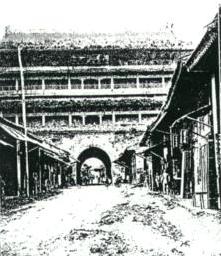
For two miles we had to pick our way through narrow, stinking, slushy streets, packed with men, boys, horses. goats, sheep, dogs, cats. and donkeys, sleeping in all over the place, while the changing of the night watchman's irons and the piercing wail of ragged, starving. filthy beggars carried one for the moment to the land of "tell thousand curses." What an unspeakable joy to reach the residence of Mr. C. W. Shields, the district inspector of China posts, who received me with the courtesy of a prince. We had scarcely spoken a dozen words when the magistrate's secretary, called for my card.
Next morning, before I was out of bed, another dignitary wanted to copy my passport, and informed me that it would be well to call at the at the Foreign Office. This I did, and found the officials polite and much interested in the object of my visit to their city, particularly his Excellency Chang Shu Shen, with whom I paid a visit to the imperial palace, one of the greatest curiosities in the whole empire and situated in the very heart of the city---a prodigious group of edifices, vast courts, gardens, kiosks, and palms, surrounded with a stately wall of considerable compass. It contains all the spacious and stately apartments of the Emperor and his family, and afforded a safe retreat for the Dowager Empress during the occupation of Peking by the foreign troops.
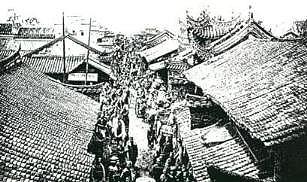 The city gates, pagodas, arches, towers, castles.
banks, and other public buildings display a magnificence that must have
been truly grand prior to the sad havoc wrought by the flooding of the
Yellow River. A number of new, ricketylooking pieces of printed yellow
and vermilion rice paper, pasted on the doors of every house and shop. I
discovered were Prayers against the evil influences of the foreign devil
that had just arrived, and it was with considerable difficulty that
I managed to get through the tremendous crowds, gathered in the streets
to hear the foreign devil speak and curse him as he passed.
The city gates, pagodas, arches, towers, castles.
banks, and other public buildings display a magnificence that must have
been truly grand prior to the sad havoc wrought by the flooding of the
Yellow River. A number of new, ricketylooking pieces of printed yellow
and vermilion rice paper, pasted on the doors of every house and shop. I
discovered were Prayers against the evil influences of the foreign devil
that had just arrived, and it was with considerable difficulty that
I managed to get through the tremendous crowds, gathered in the streets
to hear the foreign devil speak and curse him as he passed.
During the first three I located all temples and mosques likely to afford me any data, and on the fourth morning visited the ruinous site, which gave no, evidence of the magnificent synagogue that once stood there or the wealth of its community, save for a weather-beaten commemorative stone that told the strove of these people. While I was photographing and rubbing this stone, thousands of Chinese gathered around, and they came to the erroneous conclusion that I was a Jewish rabbi come to succor Chinese Jews, which the Mohammedan portion did not particularly relish, owing to the fact that a great many of the Jewish community had merged into Mohammedanism through persecution and distress. The Chinese always referred to the Jews as the "sect which pulls the sinews" and as the "Mohammedans with blue bonnets," because they wear blue bonnets as well as take off their shoes during all religious ceremonies.
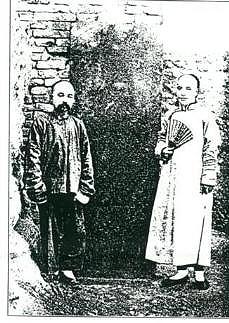 One handsome, intelligent Chinese Jew came forward
and introduced himself, inquiring very diligently the reason of my taking
the photograph and rubbing of the stone that spoke of the grandeur of his
ancestors and their synagogue. I told him that I wished to inform
the Westerners, who feel the deepest interest in the Jews, because our
Christian religion has come from a Semitic race. The long line of noble
men to whom the Jewish nation has given birth, from the time of its founder,
Abraham, and the fearless testimony which since the days of captivity it
has borne to the lofty truth that there is one God, and none other, must
ever give to the scattered people a Iarge place in our veneration and love.
Only it must be not blind, but a pure and true, veneration. born of a careful
study of all they have been and all they have done. I persuaded him
to come to the house, and he unfolded the following remarkable story:
One handsome, intelligent Chinese Jew came forward
and introduced himself, inquiring very diligently the reason of my taking
the photograph and rubbing of the stone that spoke of the grandeur of his
ancestors and their synagogue. I told him that I wished to inform
the Westerners, who feel the deepest interest in the Jews, because our
Christian religion has come from a Semitic race. The long line of noble
men to whom the Jewish nation has given birth, from the time of its founder,
Abraham, and the fearless testimony which since the days of captivity it
has borne to the lofty truth that there is one God, and none other, must
ever give to the scattered people a Iarge place in our veneration and love.
Only it must be not blind, but a pure and true, veneration. born of a careful
study of all they have been and all they have done. I persuaded him
to come to the house, and he unfolded the following remarkable story:
"My elder brother -- I am not yet forty years old, but I have thought and talked much with my friends about our ancestors, who were rich and numerous and who worshiped in a fine synagogue, built on the land presented to them bv the Emperor Tai-tsti. This synagogue, you know, has been swept away by 'China's Sorrow' [the Yellow River]. Our ancestors came to this land from the northwest nearly three thousand years ago, and had with them a roll of the law that was very ancient and in a language that we do not understand today, because we have no teachers. The beautiful synagogue had a number of courts, and in the center of the first there was a large, noble arch, dedicated to the Creator, Preserver, and Father of all men. The second comprised sacred trees, and the houses of the good men who cared for the buildings. The third had many trees, and on its walls tablets in memory of our great Chao [a Jewish mandarin judge, who rebuilt the synagogue on one occasion] and other holy men. It was very large and contained the Hall of Ancestors, the brazen vases of flowers and the censors, in honor of Abraham and others. The nerves and sinews were extracted from the animals slain for food in this court.
The synagogue itself was small, but exceedingly beautiful, and in the center was the throne of Moses, a wonderfully carved chair, covered with embroidered silk, upon which they placed the sacred book while it was read. Above the throne, in letters of gold, were wise and good words our ancestors brought from afar: 'Hear, 0 Israel: The Lord our God is one God, Blessed be the name of the Glory of his Kingdom forever and ever,' and in another part of the synagogue, 'Blessed be the Lord forever; the Lord is God of gods and the Lord; a great God, strong and terrible.' Near the arch on which these last words were written our ancestors always washed their hands except the chief rabbi who entered the 'House of Heaven' [a little square room, which none but the rabbi can enter during the time of prayer]. In the 'House of Heaven' the rolls of the law were kept in silken curtains, and on the western wall the Ten Commandments were written in large golden letters.
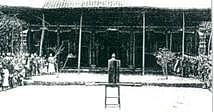 After much difficulty and tipping I persuaded my visitors
to be photographed, and then accompanied by Mr. Shields, My Hu (my interpreter),
and two soldiers, I visited mosque after mosque, which excited and annoyed
the Mohammedans, who mistook me for a Jewish rabbi in disguise.
After much difficulty and tipping I persuaded my visitors
to be photographed, and then accompanied by Mr. Shields, My Hu (my interpreter),
and two soldiers, I visited mosque after mosque, which excited and annoyed
the Mohammedans, who mistook me for a Jewish rabbi in disguise.
The fourth proved to be the one I wanted, for in a small room I saw the ark on a table, and made toward it, when the crowd objected and pushed me out, emphasizing their disapproval in no uncertain manner. The soldiers were helpless, but I had a strong suspicion that they were at heart with the mob. The climax came when I clambered on the roof of the mosque and began to examine the tiles, for thousands of Chinese surrounded the mosque, yelling out, "Kick the devil's stomach!"' "'Batter his devil's brain on the stones!" "Kill the Jew!" "Choke the sinew-puller!" "Tear the foreign devil's entrails out!" and other diabolical things too numerous and too disgusting to mention. The majority were armed with bricks, clubs, or knives and were mad with rage. Every second I thought would be my last, for the fury of the Chinese mob beggars all description.
A happy thought flashed through my mind and, quick as lightning, I pulled out my folding camera and turned it toward them, thinking to photograph the murderous beasts before they butchered me. The shock was tremendous; they dropped their bricks, knives, and clubs, and crushed and jammed one another in their rush from the "devil's glass." My friend, interpreter, and soldiers very discreetly banged and fastened the doors after them, and the interpreter explained to the Mohammedan priests that I was not a Jew, but a British traveler, and only wanted to see these things. They said if I would promise that in the event of the Jewish synagogue being rebuilt their mosque would not be interfered with, the people would be pacified and permit me to see the ark and examine the tiles. They are much afraid their mosque will be destroyed if the synagogue is rebuilt, in order to get tiles which they have stolen. I promised everything they asked.
The Confucians are more kindly disposed toward the Jews than the Mohammadedans (who always pull their gowns to one side if they meet a Jew, which in China is a vile insult); and so on visiting their temples I had no difficulty -- in fact, one priest accompanied me to a small temple in the southeast corner of the city, where they have what is left of four large marble pillars, taken from the Jewish ruins in the early part of the sixth century. It is interesting to note in Chinese history that at this time the Empress Dowager Ling attended by the imperial consorts, ladies of the palace, princesses, and others of high degree, ascended a lofty hill and abolished the various corrupt systems of religious worship, except that of the foreigner who prayed toward the west.
